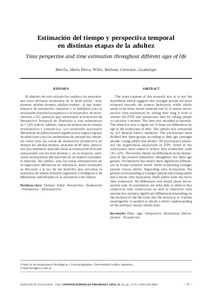Por favor, use este identificador para citar o enlazar este ítem:
https://repositorio.uca.edu.ar/handle/123456789/6184| Título: | Estimación del tiempo y perspectiva temporal en distintas etapas de la adultez Time perspective and time estimation throughout different ages mof life |
Autor: | Brenlla, María Elena Willis, Bárbara Germano, Guadalupe |
Palabras clave: | TIEMPO; EDAD; PERSPECTIVA; ESTIMACION; PROSPECTIVA; ADULTOS; ADULTOS JOVENES; ADULTOS MAYORES; PSICOLOGIA | Fecha de publicación: | 2016 | Editorial: | Universidad de Buenos Aires. Facultad de Psicología | Cita: | Brenlla, M.E., Willis, B., Germano, G. (2016). Estimación del tiempo y perspectiva temporal en distintas etapas de la adultez [en línea]. Investigación en psicología 21(1). Disponible en: https://repositorio.uca.edu.ar/handle/123456789/6184 | Proyecto: | La temporalidad subjetiva en la juventud y la adultez, y su relación con el autocontrol | Resumen: | Resumen: El objetivo de este artículo fue analizar las asociaciones entre distintos momentos de la edad adulta –muy jóvenes; adultos jóvenes; adultos medios-, el tipo predominante de perspectiva temporal y la habilidad para la estimación temporal prospectiva y retrospectiva. Se entrevistaron a 323 personas que contestaron al Inventario de Perspectiva Temporal de Zimbardo y, una submuestra (n=125) realizó, además, tareas de estimación de tiempo retrospectiva y prospectiva. Los resultados mostraron diferencias estadísticamente significativas según el grupo de edad tanto para las preferencias de perspectiva temporal como para las tareas de estimación prospectiva de tiempo: los adultos medios –mayores de 45 años- mostraron una tendencia marcada hacia la orientación al futuro comparados con los más jóvenes y, en su mayoría, realizaron estimaciones del intervalo de un minuto claramente menores. En cambio, para las tareas retrospectivas no se registraron diferencias de relevancia. Estos resultados se discuten a la luz de los modelos que postulan la existencia de relojes internos cognitivos o biológicos o de diferencias individuales en la perspectiva del tiempo Abstract: The main purpose of this research was a) to test the hypothesis which suggests that younger people are more oriented towards the present hedonistic while adults tends to be more future oriented and b) to assess retrospective time estimation by asking how long it took to answer the ZTPI and prospective time by asking people to calculate 1 minute. The time was recorded in seconds. The objective was to figure out if there are differences by age in the estimation of time. The sample was composed by 323 Buenos Aires’s residents. The participants were divided into three groups according to their age (younger people; young adults and adults). All participants answered the Argentinian adaptation of ZTPI. Some of the participants were asked to realize time estimation tasks (N=125). The results shown no differences in the dimension of the present hedonistic throughout the three age groups. Furthermore the results show significant differences in future oriented scores when comparing younger people versus adults. Regarding time estimation, the groups corresponding to younger people and young adults had a better time estimation while adults were the worst time estimators. No differences was found about retrospective task. In conclusion, we were able to observe that subjective time orientation as well as objective time perspective presents significant differences depending on the moment of the life cycle that the person is at. Further investigation is needed to obtain a better understanding of the previous results shown here |
URI: | https://repositorio.uca.edu.ar/handle/123456789/6184 | ISSN: | 0329-5893 | Disciplina: | PSICOLOGIA | Derechos: | Acceso Abierto | Fuente: | Investigaciones en Psicología 21(1), 2016 |
| Aparece en las colecciones: | Artículos |
Ficheros en este ítem:
| Fichero | Descripción | Tamaño | Formato | |
|---|---|---|---|---|
| brenlla.pdf | 109,78 kB | Adobe PDF |  Visualizar/Abrir |
Visualizaciones de página(s)
3.183
comprobado en 30-abr-2024
Descarga(s)
1.879
comprobado en 30-abr-2024
Google ScholarTM
Ver en Google Scholar
Este ítem está sujeto a una Licencia Creative Commons

